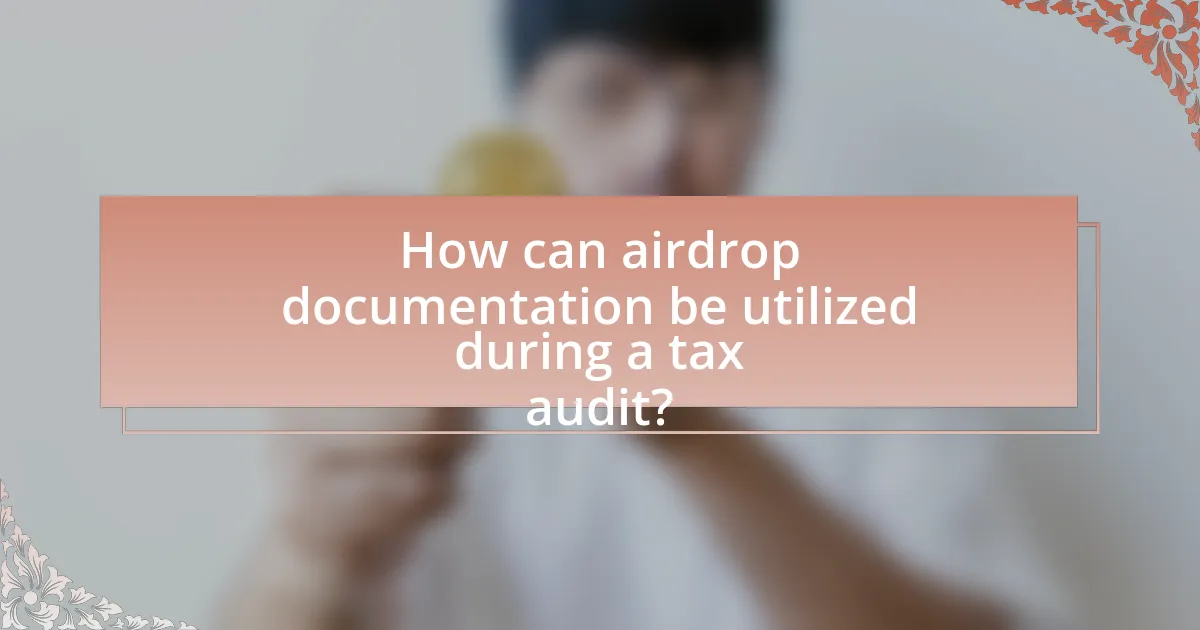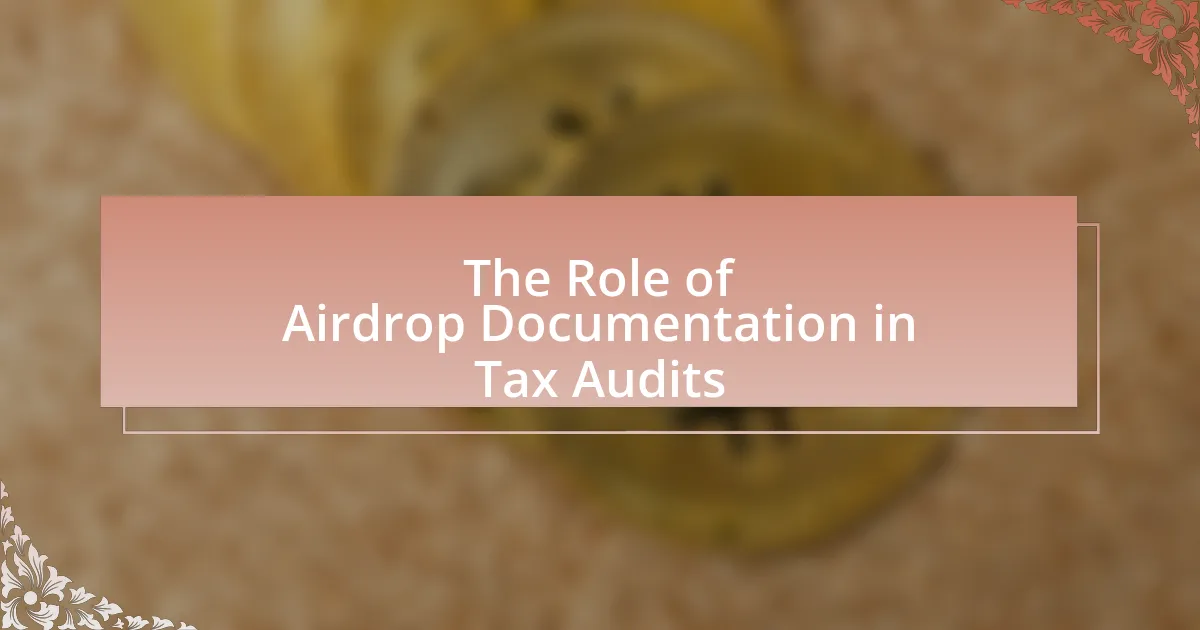Airdrop documentation is essential for tax audits as it provides a clear record of cryptocurrency received through airdrops, which is necessary for accurate tax reporting. This documentation helps taxpayers substantiate the fair market value of airdropped assets at the time of receipt, ensuring compliance with IRS regulations that classify airdrops as ordinary income. Key elements of effective airdrop documentation include the date of the airdrop, the amount of tokens distributed, and the involved wallet addresses. Properly maintained records not only support claims during audits but also mitigate the risk of penalties and legal issues associated with inadequate documentation.

What is the Role of Airdrop Documentation in Tax Audits?
Airdrop documentation plays a crucial role in tax audits by providing a clear record of cryptocurrency received through airdrops, which is essential for accurate tax reporting. This documentation helps taxpayers substantiate the fair market value of the airdropped assets at the time of receipt, ensuring compliance with tax regulations that require reporting income from all sources, including cryptocurrency. The Internal Revenue Service (IRS) mandates that taxpayers report income from airdrops as ordinary income, making proper documentation vital for demonstrating the legitimacy and value of the received assets during an audit.
How does airdrop documentation impact tax compliance?
Airdrop documentation significantly impacts tax compliance by providing a clear record of the receipt of cryptocurrency assets, which is essential for accurate tax reporting. This documentation serves as evidence of income, as the IRS treats airdropped tokens as taxable income at the fair market value at the time of receipt. For instance, if an individual receives 100 tokens valued at $1 each, they must report $100 as income. Proper documentation helps taxpayers substantiate their claims during audits, ensuring they meet regulatory requirements and avoid penalties. Accurate records also assist in calculating capital gains or losses when the tokens are sold or exchanged, further reinforcing compliance with tax obligations.
What specific information should be included in airdrop documentation?
Airdrop documentation should include the date of the airdrop, the amount of tokens distributed, the wallet addresses involved, and the purpose of the airdrop. This information is crucial for tax audits as it provides a clear record of transactions and the rationale behind them. Accurate documentation helps in determining the fair market value of the tokens at the time of receipt, which is essential for reporting income and capital gains. Furthermore, including details about the airdrop’s compliance with regulations can support the legitimacy of the transactions during audits.
How can accurate documentation prevent tax-related issues?
Accurate documentation can prevent tax-related issues by providing clear and verifiable records of income, expenses, and transactions. This clarity helps taxpayers substantiate their claims during audits, reducing the risk of discrepancies that could lead to penalties or additional taxes owed. For instance, the IRS emphasizes the importance of maintaining thorough records to support reported income and deductions, which can mitigate the likelihood of audits and disputes. Furthermore, accurate documentation ensures compliance with tax laws, as it allows individuals and businesses to track their financial activities effectively, thereby minimizing errors that could trigger tax liabilities.
Why is airdrop documentation important for tax audits?
Airdrop documentation is crucial for tax audits because it provides a clear record of the cryptocurrency received, which is necessary for accurate tax reporting. This documentation helps taxpayers substantiate the fair market value of the airdropped assets at the time of receipt, ensuring compliance with tax regulations that require reporting income from cryptocurrency. The Internal Revenue Service (IRS) mandates that taxpayers report all income, including cryptocurrency received through airdrops, as taxable income. Without proper documentation, individuals may face challenges in proving their claims during audits, potentially leading to penalties or disputes with tax authorities.
What are the potential consequences of inadequate documentation?
Inadequate documentation can lead to significant consequences, including increased risk of tax audits and potential penalties. When documentation is insufficient, tax authorities may question the legitimacy of reported income or deductions, resulting in audits that can be time-consuming and costly. Furthermore, a lack of proper records can lead to fines, interest on unpaid taxes, and even legal repercussions if discrepancies are found. For instance, the IRS has strict requirements for record-keeping, and failure to comply can result in penalties of up to 20% for underreporting income. Thus, maintaining thorough documentation is essential to mitigate these risks and ensure compliance with tax regulations.
How do tax authorities view airdrop transactions?
Tax authorities generally view airdrop transactions as taxable events. When individuals receive cryptocurrency through airdrops, tax authorities often classify this as income, requiring recipients to report the fair market value of the tokens at the time of receipt. For instance, the Internal Revenue Service (IRS) in the United States has issued guidance indicating that airdropped tokens are considered ordinary income, which must be reported on tax returns. This classification aligns with the broader tax treatment of cryptocurrency, where any gain or income derived from digital assets is subject to taxation.

What are the best practices for maintaining airdrop documentation?
The best practices for maintaining airdrop documentation include ensuring accuracy, consistency, and accessibility of records. Accurate documentation involves recording the details of each airdrop, such as the date, amount, recipient addresses, and the purpose of the airdrop. Consistency is achieved by using standardized formats and templates for documentation, which helps in maintaining uniformity across records. Accessibility means that documentation should be stored in a secure yet easily retrievable manner, allowing for quick access during tax audits or regulatory reviews. These practices are essential as they provide a clear audit trail, which is crucial for compliance with tax regulations and can help mitigate potential legal issues.
How can individuals and businesses effectively track airdrop transactions?
Individuals and businesses can effectively track airdrop transactions by utilizing blockchain explorers, which provide real-time data on token transfers. Blockchain explorers allow users to input wallet addresses and view all associated transactions, including airdrops, thereby ensuring accurate record-keeping. For instance, platforms like Etherscan for Ethereum-based tokens display transaction histories, enabling users to confirm the receipt of airdropped tokens and their corresponding timestamps. This method is essential for maintaining compliance during tax audits, as accurate documentation of all transactions, including airdrops, is required for reporting purposes.
What tools or software can assist in documenting airdrops?
Tools such as CoinTracking, Koinly, and CryptoTrader.Tax can assist in documenting airdrops. These software solutions provide features for tracking cryptocurrency transactions, including airdrops, and generating tax reports. CoinTracking allows users to import data from various exchanges and wallets, automatically categorizing airdrops for easier reporting. Koinly offers similar functionalities, enabling users to calculate capital gains and losses while documenting airdrops. CryptoTrader.Tax simplifies the process by providing a user-friendly interface for importing transaction data and generating necessary tax documentation.
How often should documentation be reviewed and updated?
Documentation should be reviewed and updated at least annually or whenever there are significant changes in regulations or procedures. Regular reviews ensure that the documentation remains accurate and compliant with current tax laws, particularly in the context of airdrop transactions, which can be subject to evolving tax guidelines. For instance, the IRS updates its guidance on cryptocurrency and related transactions periodically, necessitating timely updates to documentation to reflect these changes.
What common mistakes should be avoided in airdrop documentation?
Common mistakes to avoid in airdrop documentation include insufficient detail about the airdrop’s purpose, lack of clear eligibility criteria, and failure to document the distribution process. Insufficient detail can lead to misunderstandings regarding the airdrop’s intent, while unclear eligibility criteria may result in disputes over who qualifies for the airdrop. Additionally, not documenting the distribution process can complicate tax audits, as it may obscure the transaction history and the value of the airdrop received. Accurate and comprehensive documentation is essential for compliance and clarity during tax audits.
How can misreporting airdrop values affect tax obligations?
Misreporting airdrop values can lead to inaccurate tax obligations, resulting in potential underpayment or overpayment of taxes. When individuals report lower values than the actual fair market value of the airdropped tokens, they may pay less tax than required, which can trigger audits and penalties from tax authorities. Conversely, reporting higher values may lead to overpayment, causing unnecessary financial strain. The IRS treats airdrops as taxable income at the time of receipt, and accurate reporting is essential to comply with tax laws and avoid legal repercussions.
What are the risks of failing to document airdrop receipts?
Failing to document airdrop receipts poses significant risks, primarily related to tax compliance and potential financial loss. Without proper documentation, individuals may face challenges in substantiating their income during tax audits, leading to the possibility of penalties, interest on unpaid taxes, or even legal repercussions. The IRS requires accurate reporting of all income, including cryptocurrency received through airdrops, and lacking receipts can result in misreporting, which is a violation of tax laws. Historical data shows that taxpayers who cannot provide adequate documentation during audits are more likely to incur fines, as evidenced by IRS enforcement actions that emphasize the importance of maintaining thorough records for all cryptocurrency transactions.

How can airdrop documentation be utilized during a tax audit?
Airdrop documentation can be utilized during a tax audit to substantiate the receipt of cryptocurrency as income. This documentation provides evidence of the date, amount, and nature of the airdrop, which is essential for accurately reporting taxable events. For instance, the Internal Revenue Service (IRS) requires taxpayers to report income from cryptocurrency airdrops at fair market value on the date of receipt. Properly maintained records, such as transaction logs and communication from the issuing entity, can help demonstrate compliance with tax regulations and support the taxpayer’s claims during the audit process.
What role does airdrop documentation play in audit defense?
Airdrop documentation plays a critical role in audit defense by providing verifiable evidence of the transactions and distributions involved. This documentation helps establish the legitimacy of the airdrop, detailing the recipients, amounts, and the purpose of the distribution, which is essential for compliance with tax regulations. Accurate records can demonstrate that the airdrop was conducted in accordance with legal requirements, thereby reducing the risk of penalties or disputes during an audit. Furthermore, having comprehensive documentation can support claims of non-taxable events or clarify the tax implications of the airdrop, reinforcing the taxpayer’s position during an audit process.
How can well-organized documentation streamline the audit process?
Well-organized documentation can streamline the audit process by providing clear, accessible, and comprehensive records that facilitate efficient review and verification. When documentation is systematically arranged, auditors can quickly locate necessary information, reducing the time spent searching for documents and clarifying discrepancies. For instance, organized records can include transaction histories, compliance reports, and supporting evidence, which collectively enhance transparency and accuracy during audits. This efficiency is supported by studies indicating that well-structured documentation can decrease audit duration by up to 30%, thereby minimizing operational disruptions and costs associated with prolonged audits.
What evidence can airdrop documentation provide to tax auditors?
Airdrop documentation can provide tax auditors with evidence of the receipt and valuation of cryptocurrency assets. This documentation typically includes transaction records, wallet addresses, and timestamps, which help establish the date and amount of the airdrop received. For instance, if an individual receives tokens through an airdrop, the documentation can show the fair market value of those tokens at the time of receipt, which is crucial for determining taxable income. Additionally, airdrop documentation can serve as proof of compliance with tax regulations, as it demonstrates the taxpayer’s transparency in reporting income derived from cryptocurrency activities.
What are the implications of airdrop documentation for future tax audits?
Airdrop documentation has significant implications for future tax audits as it provides a clear record of received assets, which is essential for accurate tax reporting. Proper documentation helps taxpayers substantiate the value of airdropped tokens, ensuring compliance with tax regulations that require reporting income from cryptocurrency transactions. For instance, the IRS mandates that taxpayers report the fair market value of airdropped tokens as income at the time of receipt, making thorough documentation crucial for verifying reported amounts during audits. Inadequate or missing documentation can lead to discrepancies, potential penalties, and increased scrutiny from tax authorities.
How can maintaining thorough documentation influence future tax strategies?
Maintaining thorough documentation can significantly influence future tax strategies by providing a clear and organized record of transactions, deductions, and income sources. This comprehensive documentation enables taxpayers to substantiate claims during audits, ensuring compliance with tax regulations and maximizing eligible deductions. For instance, the IRS emphasizes the importance of keeping accurate records to support tax returns, which can lead to reduced tax liabilities and informed decision-making for future tax planning. By having detailed documentation, individuals and businesses can identify trends, assess tax implications of various financial activities, and strategically plan for future tax obligations, ultimately enhancing their financial outcomes.
What lessons can be learned from past audits involving airdrop documentation?
Past audits involving airdrop documentation reveal the importance of maintaining accurate records and clear communication with tax authorities. These audits have shown that discrepancies in documentation can lead to significant penalties and complications during tax assessments. For instance, the IRS has emphasized the necessity for taxpayers to report cryptocurrency airdrops as income, and failure to do so can result in audits and fines. Furthermore, audits have highlighted the need for detailed tracking of the airdrop process, including the date of receipt, the fair market value at the time of receipt, and the purpose of the airdrop. This meticulous documentation helps ensure compliance and reduces the risk of disputes with tax authorities.
What practical tips can help ensure effective airdrop documentation?
To ensure effective airdrop documentation, maintain detailed records of each airdrop event, including dates, amounts, and recipient addresses. This practice is crucial for compliance with tax regulations, as accurate documentation provides a clear audit trail. For instance, the IRS requires taxpayers to report cryptocurrency transactions, making comprehensive records essential for substantiating claims during tax audits. Additionally, using standardized templates for documentation can streamline the process and reduce errors, further enhancing the reliability of the records.


